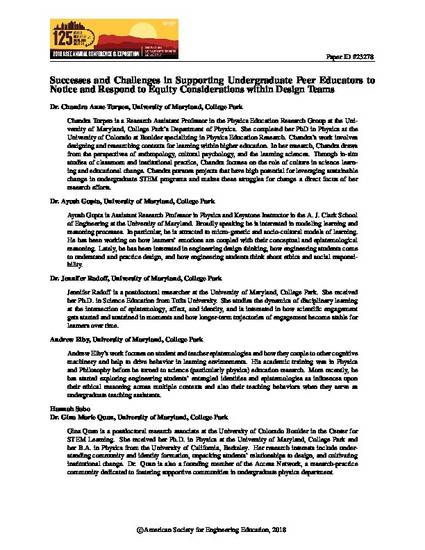
Presentation
Successes and Challenges in Supporting Undergraduate Peer Educators to Notice and Respond to Equity Considerations within Design Teams
American Society for Engineering Education
(2018)
Abstract
We describe and analyze our efforts to support Learning Assistants (LAs)—undergraduate peer
educators who simultaneously take a 3-credit pedagogy course—in fostering equitable team
dynamics and collaboration within a project-based engineering design course. Tonso and
others have shown that (a) inequities can “live” in mundane interactions such as those among
students within design teams and (b) those inequities both reflect and (re)produce broader
cultural patterns and narratives (e.g. Wolfe & Powell, 2009; Tonso, 1996, 2006a, 2006b;
McLoughlin, 2005). LAs could be well-positioned to notice and potentially disrupt inequitable
patterns of participation within design teams. In this paper, we explore (1) How do LAs notice,
diagnose, and consider responding to teamwork troubles within design teams, and (2) What
ideological assumptions plausibly contribute to LAs’ sensemaking around their students’
teamwork troubles? To do so, we analyze how the LAs notice and consider responding to issues
of equitable teamwork and participation, as exhibited in three related activities: (i) an in-class
roleplay, (ii) observing and diagnosing teamwork troubles (TTs) in the engineering design
teams, and (iii) imagining possible instructional responses to those troubles, and students’
possible reactions. We articulate three modes of thinking that roughly capture patterns in LAs’
descriptions and diagnoses of, and imagined responses to, the teamwork troubles: individual
accountability, where the trouble is seen as caused by individual(s) described as “off task” or
“checked out” or demonstrating some level of incompetence; delegation of work, where the
trouble was located in the team leader’s inability to delegate tasks effectively to team members,
or in the group’s general lack of communication about what tasks need to be completed, who
should execute the tasks, and what work other groups in the team were doing; and emergent
systems, where trouble was described as a group-level phenomenon emerging from the patterns
of interaction amongst group members, contextual features, and larger structural forces. We find
that LAs drew on individual accountability and delegation of work to evaluate TTs. Much rarer
were ascriptions of TTs to interactional dynamics between teammates. We connected these
modes to the underlying ideological assumptions that have consequences for how meritocracy
and technocracy (Slaton, 2015; Cech, 2014) play out in an engineering design classroom and
serve to ameliorate or reify engineering mindsets (Riley, 2008). The modes are asymmetric, in
that emergent systems based interpretations hold more potential for elucidating ongoing social
processes, for challenging meritocracy and socio-technical duality, and for seeing power
differentials within interpersonal and institutional contexts. We argue for the need to better
understand the ideological assumptions underlying how peer-educators—and other instructors—
interpret classroom events.
Disciplines
Publication Date
2018
Location
Salt Lake City, Utah
Comments
This article was originally presented at the 2018 ASEE Annual Conference Exposition. Salt Lake City, Utah, and can also be found at this link.
© 2018 American Society for Engineering Education
Citation Information
Chandra Anne Turpen, Ayush Gupta, Jennifer Radoff, Andrew Elby, et al.. "Successes and Challenges in Supporting Undergraduate Peer Educators to Notice and Respond to Equity Considerations within Design Teams" American Society for Engineering Education (2018) Available at: http://works.bepress.com/gina-quan/9/